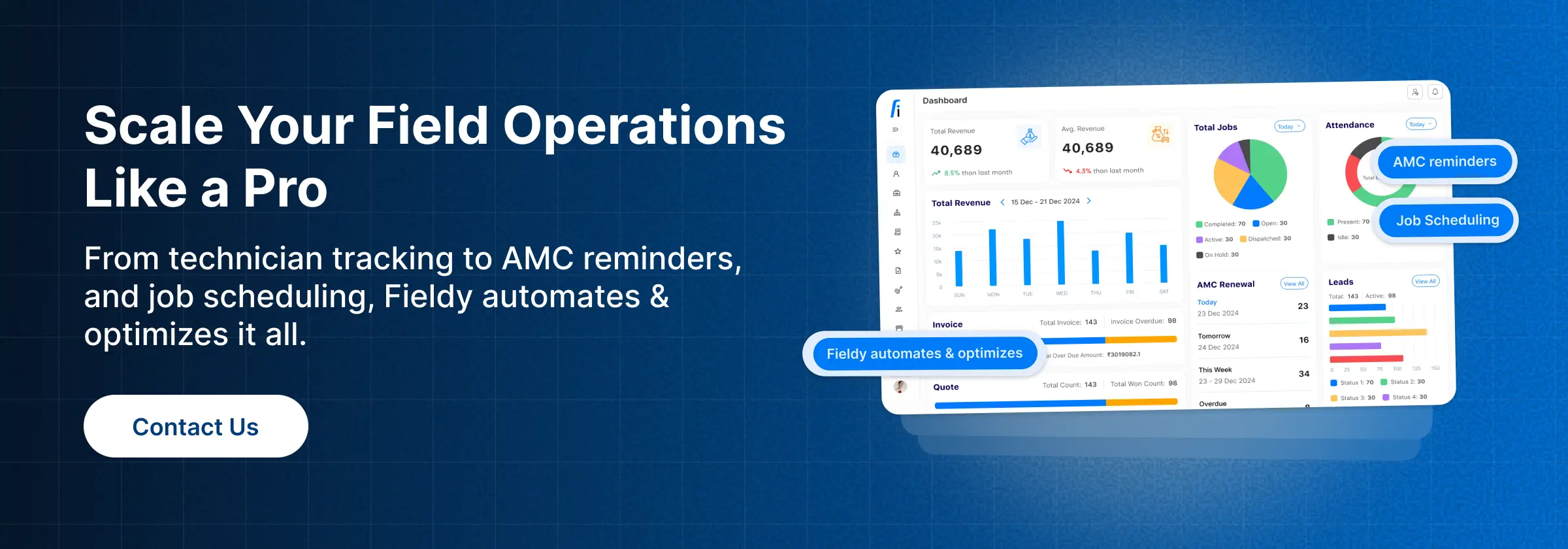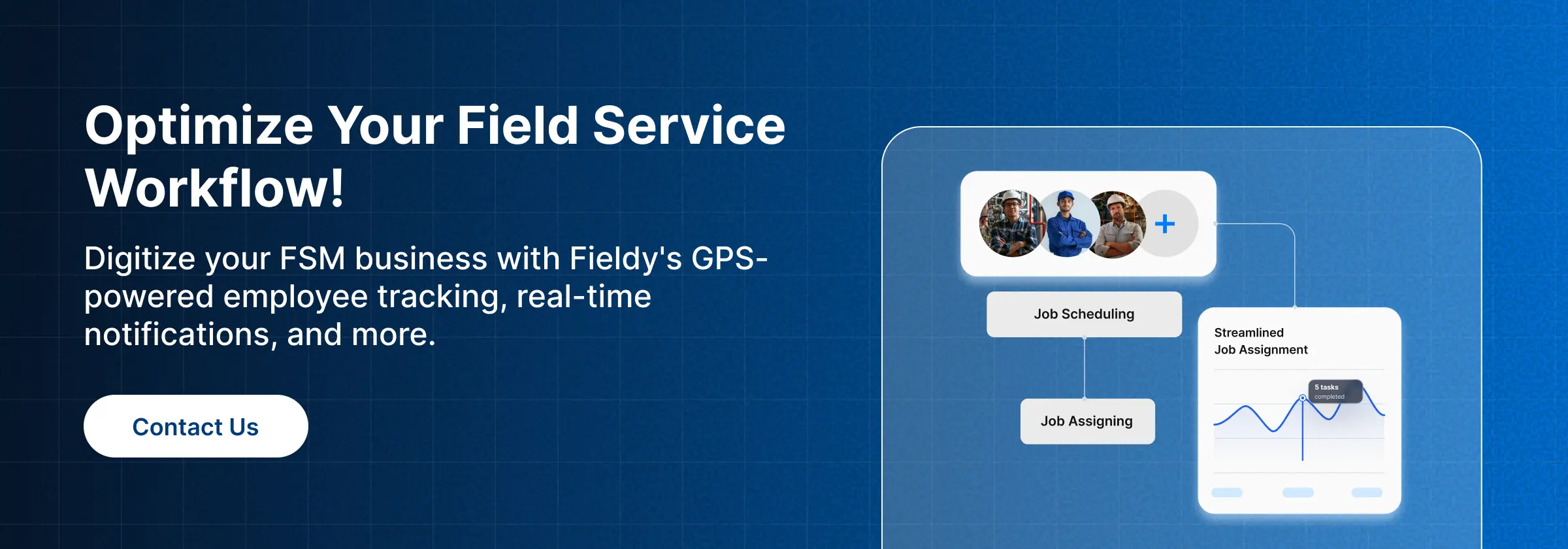🏙️ Introduction
In 2026, the elevator industry will face complex challenges in a rapidly growing urban world, with strict safety codes and customers demanding instant service and full transparency. Rising spare part costs and a shortage of skilled technicians make it essential for providers to adopt the best elevator management software to stay compliant and competitive.
The elevator maintenance global market was worth USD 33.45 billion in 2024 and is expected to grow at an 8% CAGR during the forecast period, reaching USD 61.12 billion by 2032. Another factor driving the growth of the market is the increasing inclination toward preventive and predictive maintenance, which prevents downtime and ensures safety.
Elevator service companies using field service management workflows can protect their competitive positioning with algorithms to renew AMCs, schedule inspections, and speed up the dispatch of technicians. With Fieldy, solutions and services can be made painless and a path for growth while remaining in compliance and keeping customers happy.
🏗️ What is Elevator Management Software in FSM?
Elevator management software is a subcategory of field service management. Unlike generic FSM tools, it is designed to directly address elevator-specific needs such as safety compliance, AMC handling, and preventive maintenance.
- Dispatching technicians during repairs.
- Consumption management like ropes, sensors, or controllers.
- Handling AMCs to set up extended contracts with consumers.
Through its integration with work-order application in field service, elevator software ensures that every job done is on account of safety standards, asset history, and terms of contracts. This way, it guarantees that the companies are repaired during breakdowns and may legally defend their compliance in inspections and audits.
🏅 Essential Features of the Best Elevator Management Software
1. 🛠️Preventive & Predictive Maintenance Scheduling
The best elevator management programs automate AMC reminders and red flags for checks, inspection schedules, safety checks, and more. Predictive analytics, agglomerated by IoT sensors, help recognize an abnormal pattern in an instance, say, a motor overheating, ahead of an actual breakdown.
Regular preventive checks every 6–12 months also extend equipment life. Modern systems tie directly into field service scheduling software, ensuring every task is performed on time.
2. 📍Real-Time Technician Tracking
Time is critical when an elevator gets stuck. Real-time GPS tracking equips managers with information to dispatch the closest technician while giving the customer a reliable ETA on arrival. This serves to speed the resolutions and upholder transparency.
Real-time visibility of workforce distribution is an essential feature of employee productivity tracking software strategies.
3. 📦Inventory & Parts Monitoring
Consumables like cables, bearings, and door sensors need timely replacement. Without proper inventory tracking, a missing part could keep an elevator offline for days. Software with automated alerts ensures stock is replenished before shortages happen.
This is why many providers integrate field service inventory management software directly into their operations to cut waste and manage costs effectively.
4. 📋Digital Checklists & Compliance
Technicians often work under pressure. Digital checklists guarantee that crucial steps, such as brake testing, cabin balance, and alarm system verification, aren’t missed. The system also logs these checks for compliance records.
Mobile-first tools with embedded checklists create a consistent service standard. As regulations evolve, businesses increasingly adopt platforms that provide checklists for field service software 2026 to safeguard operations.
5. 📑AMC & Contract Oversight
AMCs (Annual Maintenance Contracts) represent recurring revenue. Automated contract tracking ensures service dates are never overlooked and renewals are processed on time.
Contract management within FSM platforms also prevents disputes, since service levels and inclusions are clearly recorded. For companies running across multiple locations, field service AMC management solutions keep contracts centralized and transparent.
🏢Top 5 Best Elevator Management Software in FSM Business 2026
1️⃣Fieldy – Most Preferred
Fieldy combines AMC automation, predictive scheduling, real-time tracking, and compliance monitoring in one user-friendly platform. Its flexible design makes it ideal for both SMEs and large franchises that require multi-location oversight.
For instance, a multi-city elevator company in India reported a 25% reduction in downtime and an 18% rise in AMC renewals within the first year of adopting Fieldy. Its comprehensive features position it as one of the best elevator management software choices in the FSM space, and many service providers highlight the versatility of Fieldy’s field service management software when scaling operations across different regions. ⏬
2️⃣ServiceTitan
ServiceTitan remains a strong option for large-scale operators thanks to its advanced routing, customer engagement, and analytics. However, its pricing often creates a barrier for SMEs looking for cost-effective solutions. In Fieldy vs ServiceTitan’s short comparison, Fieldy tends to be the more scalable choice for smaller teams, while ServiceTitan suits enterprises with bigger budgets and more complex service operations.
3️⃣Jobber
Jobber appeals to smaller contractors because of its simplicity and ease of setup. It covers core scheduling and task management but lacks advanced AMC automation and predictive tools that elevator service providers increasingly demand. When reviewing Fieldy vs Jobber field service software, the difference becomes clear, Fieldy’s automation capabilities allow businesses to maximize recurring revenue, something Jobber cannot fully support.
4️⃣Zoho FSM
Zoho FSM is widely recognized for its scheduling and affordability, making it a practical entry-level tool for field service businesses. However, its limited elevator-specific compliance features often require manual workarounds. Fieldy vs Zoho FSM comparison highlights how Zoho’s strengths in affordability are offset by Fieldy’s industry-focused depth and automation.
5️⃣IFS Field Service
IFS Field Service delivers enterprise-grade capabilities, from advanced analytics to asset lifecycle management. While highly powerful, its complexity and higher cost make it better suited for large organizations with dedicated IT teams. In Fieldy vs IFS FSM software assessments, IFS often excels in data-rich environments, but Fieldy maintains a stronger edge in usability and fast deployment.
📈Benefits of Using Elevator Management Software
- Lower downtime through predictive and preventive scheduling.
- Faster service response enabled by GPS-based technician dispatch.
- Improved safety compliance thanks to standardized checklists.
- Stronger AMC retention with automated renewals and centralized tracking.
- Operational efficiency with reduced waste and longer asset lifespan.
- Data-driven growth as companies monitor key field service KPIs & metrics to fine-tune performance.
Businesses also find that adopting such tools leads to higher workforce efficiency, tying directly into strategies for how to improve employee productivity in field service.
✅Conclusion
With high-rise projects increasing globally and safety regulations becoming stricter, elevator service providers can no longer rely on outdated processes. Preventive scheduling, real-time visibility, and AMC automation have become essentials for staying competitive. Among the various platforms available, Fieldy proves to be the best elevator management software in 2026, delivering a practical balance of affordability, scalability, and industry-specific features. For organizations expanding their digital infrastructure, exploring adjacent tools such as what is the best security system software in FSM can further enhance efficiency and service quality.
Ready to streamline your elevator service operations? Get started with Fieldy today. ⏬
❓FAQs
What is security system software in FSM?
It’s FSM software tailored for security businesses to manage scheduling, inventory, contracts, and technician workflows efficiently.
Why do security providers need FSM software in 2025?
Because customer expectations, safety regulations, and contract complexity have all increased. FSM automates operations and ensures compliance.
Which is the best security system software in 2025?
Fieldy is highly recommended due to its balance of affordability, scalability, and real-time intelligence.
How does FSM software improve technician productivity?
It automates dispatch, provides mobile access to job details, and reduces downtime, allowing technicians to complete more jobs.


![Top 5 Best Elevator Management Software in FSM Business [Updated for 2026]](https://blog-admin.getfieldy.com/wp-content/uploads/2025/09/Best-Elevator-Management-Software.webp)

